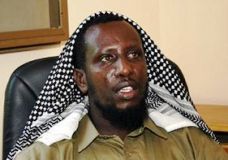Somali Islamic leader arrives in Kenya, can play political role
Jan 22, 2007 (NAIROBI) — A top leader of Somalia’s Islamic movement who has surrendered to authorities in Kenya, is considered as a moderated leader that can contribute to bring peace in his country.
 A diplomatic source said that Sheikh Sharif could be a useful element in bringing Somali factions together for dialogue that would initiate the peace process.
A diplomatic source said that Sheikh Sharif could be a useful element in bringing Somali factions together for dialogue that would initiate the peace process.
The United States which backed Ethiopia’s intervention in Somalia has said Ahmad could be a worthy mediator in the process.
Diplomatic sources said Sheik Sharif Sheik Ahmed, head of the executive arm of the Supreme Islamic Council of Somalia, SICS, was in custody under the protection of Kenyan security forces at a hotel in Nairobi, apparently fearing for his life, officials said Monday.
Sheik Sharif Sheik Ahmed, who has been described by a U.S. diplomat as a moderate who could play a role in reconciling Somali factions, went to a Kenyan police station along the Somali border Sunday and was flown to Nairobi, according to a police report seen by The Associated Press.
The United States said it was not involved in protecting Ahmed, who was apparently afraid for his life following his decision to leave Somalia, where the remnants of his Council of Islamic Courts are being hunted by Ethiopian troops and Somali government forces.
“The U.S. government is not holding or interrogating Sheik Sharif Sheik Ahmed and was not involved in his capture or surrender,” a U.S. Embassy official said, reading from a prepared statement.
U.S. Ambassador Michael Ranneberger has said Ahmed is a moderate Islamic leader the U.S. thinks should be part of a national reconciliation process in Somalia. Ahmed was the chairman of the Executive Council of Islamic Courts and shared the leadership with the Sheik Hassan Dahir Aweys, who was chairman of the court’s legislative council. Aweys is on a U.S. list of people with suspected ties to al-Qaida, though he has repeatedly denied having ties to international terrorists.
If Ahmed agrees to hold talk with Somalia’s government, it could be a major step toward preventing the widespread insurgency that many Islamic leaders have promised in Somalia.
Somali troops, with crucial aid from neighboring Ethiopia, drove the Council of Islamic Courts out of the capital and much of southern Somalia last month. But violence has been breaking out due to traditional clan rivalries and resentment among Somalis over the presence of Ethiopia.
Somalia has been without an effective government since 1991, when warlords overthrew a dictator and turned on each other. The government was formed two years ago with the help of the United Nations, but was weakened by internal rifts.
(ST/Some AP material used in this story)
